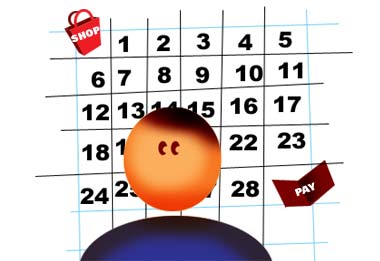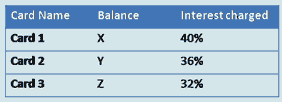
You graduate out of a college, get a decent job and join a company with stars in your eyes. You have newly found confidence and a willingness to try out new things and spend. Very soon the credit card companies start calling you with lifetime free offers and sales agents stalk you with the "Best cash-back offer!" Some even tell you "sir it's free anyways. If you take it I will get my sales commission" and you think what's wrong in keeping the free card. Thus you accumulate a few lifetime free cards...silver, gold, platinum and the co-branded ones.
You go out with friends and use the new credit card for buying some cool merchandise and why not? It's the SALE time of the year! Your credit card empowers you, no doubt. It's convenient, hassle free and an excellent tool to impress friends and family. Some friends even envy the number of credit cards you carry in your wallet. Many people get carried away and don't notice this overindulgence until they receive their credit card statement and realise they don't have sufficient balance to pay the dues.
The card company comes to your rescue and assures you can pay only minimum balance and they will take care of the rest. After all you are their esteemed customer.
Right here your journey towards the debt trap begins!
Illustration: Rediff Archives
Investmentyogi.com is a one-stop personal finance website which helps in managing finances, investments and taxes through services like financial planning, online tax filing, budgeting and 'Ask the Expert'.

One needs to understand how credit card debt works. Ignorance can be fatal to your fiscal health. Facts you should know:
Illustration: Dominic Xavier
Investmentyogi.com is a one-stop personal finance website which helps in managing finances, investments and taxes through services like financial planning, online tax filing, budgeting and 'Ask the Expert'.

Are you covered up in a credit card debt blanket? Not to worry. It is possible to get out of the debt trap provided you analyse the situation with a cool mind.
Below are some of the rules which would assist you in getting out of debt and stay debt-free:
Rule 1: Do a reality check
Create a list of all expenditure you have done in the past 3-6 months (you can refer to the credit card statements, ATM withdrawals and bank statements). Try to see where and how you have overspent. Promise yourself not to repeat this mistake. Work on savings target for next few months which might include painful cut downs in entertainment and luxury expenses. Get a monthly budget done. This way you can keep track of monthly expense outflows and curtail unnecessary expenditure. There are many online budgeting tools available including one at InvestmentYogi.
Rule 2: Prioritise
If you have debt on many cards as shown in the table, prioritise. Arrange your debt in decreasing order of interest charged. Paying off card 1 should be your priority and then card 2 and so on.
Investmentyogi.com is a one-stop personal finance website which helps in managing finances, investments and taxes through services like financial planning, online tax filing, budgeting and 'Ask the Expert'.

The minimum payment goes towards the interest part of the outstanding amount and your principal remains the same. In this way you will never be able to clear your full dues. Pay the whole amount. Use your savings to pay off the debt. It makes no sense to earn 3 per cnet cent on your savings and pay 36 per cent on your credit card. Borrowing from friends and family could be last but one option to clear off your credit card dues.
Rule 5: Don't discount a personal loan
The last option could be to take a personal loan to clear off your dues as the interest charged on a personal loan is relatively cheaper than loan on credit card.
Rule 6: Don't own too many credit cards
They may boost your net worth in the short term but can get fussy and entangle you into the debt trap if not monitored regularly. It is wiser to keep the one with most benefits and trash the rest. This is a healthier way to keep track of your finances too).
Credit cards can be great friends in need but also the worst enemy if not used responsibly.
Investmentyogi.com is a one-stop personal finance website which helps in managing finances, investments and taxes through services like financial planning, online tax filing, budgeting and 'Ask the Expert'.